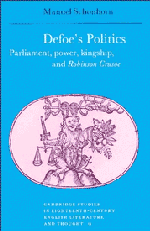Book contents
- Frontmatter
- Contents
- Dedication
- Preface and acknowledgments
- A note on attributions
- List of abbreviations
- Introduction
- 1 Defoe, dissent, and monarchy
- 2 Defoe's Reflections Upon the Late Great Revolution and the political languages of 1689
- 3 Defender of the king, 1689–1701
- 4 From the death of William III to Jure Divino, 1702–1706
- 5 Jure Divino
- 6 The politics of Robinson Crusoe
- Select bibliography
- Index
2 - Defoe's Reflections Upon the Late Great Revolution and the political languages of 1689
Published online by Cambridge University Press: 19 August 2009
- Frontmatter
- Contents
- Dedication
- Preface and acknowledgments
- A note on attributions
- List of abbreviations
- Introduction
- 1 Defoe, dissent, and monarchy
- 2 Defoe's Reflections Upon the Late Great Revolution and the political languages of 1689
- 3 Defender of the king, 1689–1701
- 4 From the death of William III to Jure Divino, 1702–1706
- 5 Jure Divino
- 6 The politics of Robinson Crusoe
- Select bibliography
- Index
Summary
On 6 February 1689 Englishmen who had met in the Convention to resolve the remarkable happenings of the previous three months declared
that James the Second, having endeavoured to subvert the constitution of the kingdom by breaking the original contract between king and people, and by the advice of Jesuits and other wicked persons having violated the fundamental laws and having withdrawn himself out of this kingdom, has abdicated the government and that the throne is thereby become vacant.
The Prince and Princess of Orange were then proclaimed King and Queen of England. In awesome ceremony one week later, the coronation of the new monarchs formalized the dramatic and, for many, unexpected consequence of the English Revolution. One aspect of the pamphlet debate that had begun with William's invasion and James II's flight came to an end. The proposals that had appeared during those heady days before the proclamation of the lords and commons of the Convention, of melting down the English constitution and making it anew, or of reconstituting the commonwealth, now gave way to the need to justify the new regime. The Declaration of Rights, which was read to and accepted by the new monarchs on 13 February, stipulated the new oaths of allegiance and supremacy that were to be taken.
- Type
- Chapter
- Information
- Defoe's PoliticsParliament, Power, Kingship and 'Robinson Crusoe', pp. 21 - 42Publisher: Cambridge University PressPrint publication year: 1991

